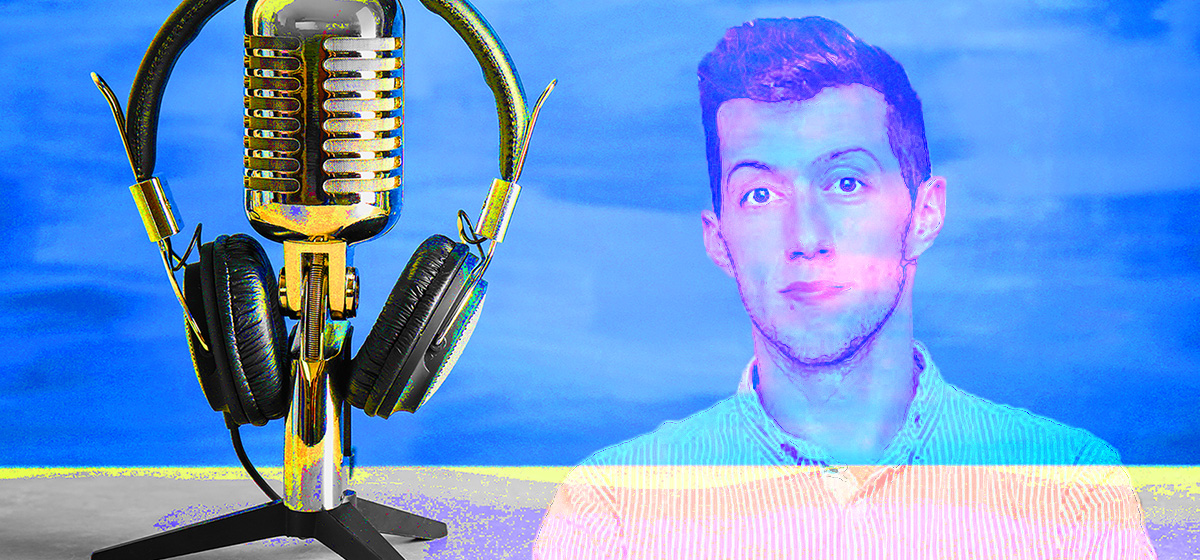Pittsburgh Tomorrow Podcast: Aaron Watson, CEO of Piper Creative

We began recording the voices of Pittsburgh Tomorrow in January through early March as a new decade fueled excitement about the future of our community. We delayed publishing the interviews, however, during the pandemic shutdowns. Now, it is too soon to know how the virus, it’s economic aftermath and the recent protests and riots will alter the macro trends shaping Pittsburgh’s future. The world has changed in ways still unknown, but the issues facing Pittsburgh remain, still awaiting our need to address and solve them. Please join us weekly to discover the bold, imaginative and transformative ideas that will build Pittsburgh Tomorrow.
View the episode archive here. Read Aaron Watson’s full bio here.
“In the same way that you would be appalled if your children graduated from high school with an inability to write, I think that we should be equally appalled if they’re not graduating with a basic competency in visual media—visual literacy—because of how important that is for communication in the modern world.” —Aaron Watson
Donald Bonk: Hello and welcome to Pittsburgh Tomorrow. I’m Donald Bonk. I’m passionate about the future. Let’s take a journey there. You’ll hear from Pittsburgh’s most compelling leaders, thinkers and creators. Through their imaginations and voices, we’ll explore the decades to come.
I have here as my guest today Aaron Watson, a 28-year-old creative person who runs and founded Piper Creative here on the South Side. We’re at Terminal 43 in the Beauty Shoppe complex. And for this series, we wanted to capture really cutting edge Pittsburgh being transformed before our eyes. And so that’s why we’re here today with Aaron. So, Aaron, welcome.
Aaron Watson: Thank you for having me.
Bonk: You’re a really extraordinarily energy-filled person and idea-filled person. Give us a little bit of a background on who you are, where you’re from, and let the audience know what your story is.
Watson: I grew up in North Hills. My mom grew up in Polish Hill. My dad grew up in Greenfield, so I’m Pittsburgh through and through. I went to the University of Pittsburgh and won two national championships as captain of the ultimate Frisbee team there.
After graduation, I got really into digital media and started producing my own podcast, which has since published more than 400 episodes that have been downloaded hundreds of thousands of times in more than 120 different countries. And that set the basis for the founding of Piper, a digital media company and a digitally native vertical brand headquartered here in Pittsburgh.
Bonk: What do you personally think would make Pittsburgh the best city in the world or one of the best, and why?
Watson: I think the two big steps that would take Pittsburgh to the next level would be a world class public transportation system—connecting to the airport, connecting people around different communities of Pittsburgh together, making the entire city much more accessible.
And then as people move around the city, I think that the continued welcoming of people from other cultures—whether these are refugees or immigrants or folks from all over the globe that make the U.S. such an amazing melting pot—can make Pittsburgh an amazing melting pot. That not only does things for our workforce, but it does things for the different industries where Pittsburgh hangs its hat.
Think about Pittsburgh as a food destination with really special places like Superior Motors and Morcilla and some of these other places—they’re just absolutely amazing. It is the introduction of those different communities that allows us to have a wide array of cultural cuisine. I think that those two things would make someone who comes to Pittsburgh be floored with the day-to-day life experience of being here.
Bonk: I’m going to explore just a little bit so that we can round out that vision. When you say transportation connecting everything, do you have any sense of what type of infrastructure that you think people would gravitate to? You have Uber and Lyft now. You can get from anywhere in the city to anywhere without a car. When you’re talking about public transportation options, are you talking about a bus? What’s your sense of what types of transportation?
Watson: I think we’d be excited about transit out to the airport that is cost effective. The Ubers and Lyfts: They work and they are second nature to us when we’re going out for a drink or need convenience, but Uber and Lyft are also losing a lot of money. They need to slash their expenses and raise their prices and continue to actually push their thumb down on the drivers, unfortunately.
I’ve been to Hong Kong, Singapore, Tokyo— I’ve been to these places with just other worldly public transportation that is on time to the dot, that is fast, that is clean. And I don’t think that there is a particularly strong preference in that being a bus versus a train versus some other specific mode.
It’s really more the capacity and the language around, hey, I could get there and I don’t have to necessarily own this car. I could spend more time on my device or talking to the people that I’m with or getting other things done. The capacity to continue to be even more connected and take your eyes off the steering off the road, your hands off the steering wheel and engage in these worlds that are deeply stimulating and entertaining is what people aspire to.
Bonk: You’ve brought up a really powerful point that I’d like to share with our audience. If you’re driving a car, you can listen to an audiocast, but you shouldn’t legally and otherwise be reading from the phone. It’s unsafe. You want a transit option that enables you to continue to work on your phone. And so if you’re on a subway, or on a T, or on a gondola, or even an Uber or Lyft for that matter, with another driver or even an autonomous driver in Pittsburgh of the future, you can maintain connectivity with the virtual world that actually makes you either popular or makes you money or whatever other value that comes from engaging in it.
Watson: The virtual world is where you live most of your life if you’re in my generation. There are conversations that I have with people every single day. I’m in the same group message that I’ve been in for five years with my teammates from the University of Pittsburgh. We talked about three different things already today in that group message as if we were all sitting around this table together. And it’s constant. It’s ubiquitous.
When I’m talking about public transportation. I’m not talking about being on a bus or train. I’m talking about more conversation with those people that matter the most to me.
Bonk: So, you’re buying back time. Public and ubiquitous transit buys you back time to spend more of your life in the world and that means a lot to you. There’s real life human interaction that takes place when you go to Lawrenceville, or to the South Side, or to Oakland or what not, and you want to engage when you get there. But that time in between is time that you can spend in your other world.
Watson: People make the mistake of thinking it’s like, oh, these young people and their relationship with their phone. The phone is the gateway to the people that I have the relationship with. And whether that’s a content creator that I love that I’ve never met and I’m entertained by, formed by and inspired by, or the people that actually really do matter and are closest to me… It is the vehicle to that.
Bonk: A car to me at 16 was a gateway to experiences. What you’re telling me now is that the phone is your car, because instead of driving physically to it, you’re engaging through that screen, and that your transit is just a means to an end. You do want to have real time and real-life experiences, but in balance with your virtual.
Watson: I’ve been updated on four things about my fiancé’s life since I left her physical presence this morning. It didn’t disrupt a meeting. It didn’t disrupt my driving. It didn’t disrupt the other engagements that I had today. And that’s what matters: the people closest to you.
Bonk: This is extraordinarily helpful to people in my generation to understand the world that you live in. It’s literally a different world. Now I want to bring it down to more practical, implementable, doable things. 1990 and 2050 or equidistant from today. I remember 1990 well. You probably weren’t born yet?
Watson: I was born in ’91.
Bonk: What are three things, looking in kind of a three-decade timeframe, that you’d like to see implemented on a practical level in Pittsburgh?
Watson: The first one, and this would be across city schools: Every student, every young person in the city of Pittsburgh having both experience and basic training in the use of a camera.
Bonk: So, visual literacy in the form of a camera. You mean not only static camera, but video, right?
Watson: In the same way that you would be appalled if your children graduated from high school with an inability to write, I think that we should be equally appalled if they’re not graduating with a basic competency in visual media—visual literacy—because of how important that is for communication in the modern world.
The next one would be open up an academy for aspiring E-sports athletes. Tyler Blevins “Ninja” is making 20 to 30 million dollars this year to play video games on Mixer, which is owned by Microsoft, instead of Twitch, which is owned by Amazon. The four biggest players in investing for video game live streaming, which is where someone watches someone as a live stream on the Internet are Twitch, owned by Amazon; Mixer, owned by Microsoft; YouTube, owned by Google; and Facebook.
Bonk: Some of the most highly valued companies in the world.
Watson: And very, very savvy about knowing where people’s attention is. Very, very savvy about knowing where the ball is going, not just where it is right now.
Bonk: So, somebody in 1968 would be going to a concert. Now people are going to watch other people play video games and watching it in real time on their devices?
Watson: One hundred percent. 20 years ago, people did not—could not—conceive of someone making 20 million dollars a year to play video games.
Bonk: That’s a salary that a major sports star would make.
Watson: Precisely. And I know that this is a jump for people, but in the same way that people look back on their time playing football, basketball or baseball as not just, hey, I learned a sport, but I learned the values of the game. I would go so far as to say that the teamwork associated with winning a League of Legends championship requires a lot of those same universal principles.
Bonk: Collaboration, discipline, trust, bonding with your teammates. Like you just said, you’re still in a group chat with your ultimate Frisbee people. What you’re saying is in the virtual world, people are developing those same deep personal relationships, only virtually.
Watson: One hundred percent.
The third is that in the same way that Pittsburgh became this place for experimentation with the concept of self-driving cars, it has the capacity to experiment with different fundamental models of schooling. I’m talking like home schooling or more very out there styles of schooling, whatever can be done to stimulate and enable that, like teaching every kid to use a camera.
What I know is down at the ground grassroots level, there are staggering tutorials on every single element of how to use a camera, how to shoot, how to use this specific feature of this specific dial on the device, and that’s there on YouTube.
There are some of the best libraries of any metropolis here in Pittsburgh thanks to Carnegie. There’s all these things here to be tapped into, and I’m positive that a more innovative approach to how education is delivered and actually think about where we are in 2020 with something like YouTube, and something like Wikipedia. I can remember being in school and being told not to use Wikipedia for my reports. I can remember being told that because it was new, it was weird, it was dangerous, and it was different. Now, that is the first place that I go for the information that I need.
I know that educators and administrators have that constant challenge of trying to push that ball forward, but letting this be a fertile ground for experimentation with home schooling and other really different styles of educating people would do so much to transform the next generation. For the types of parents that are looking to bring their families to places where that happens, it’d be pretty cool.
Bonk: Well, we really stretched our imaginations here today. Pittsburghers of every age need to hear what Aaron Watson’s saying about what we need to do in Pittsburgh to be the best city in the world. So I want to thank Aaron. We’re very grateful for his thoughts. And I know that this message needs to go out not only to Pittsburghers, but folks around the world to hear the exciting things that are happening in Pittsburgh.
Watson: I appreciate the opportunity to be here.
Bonk: Thank you for your time.





